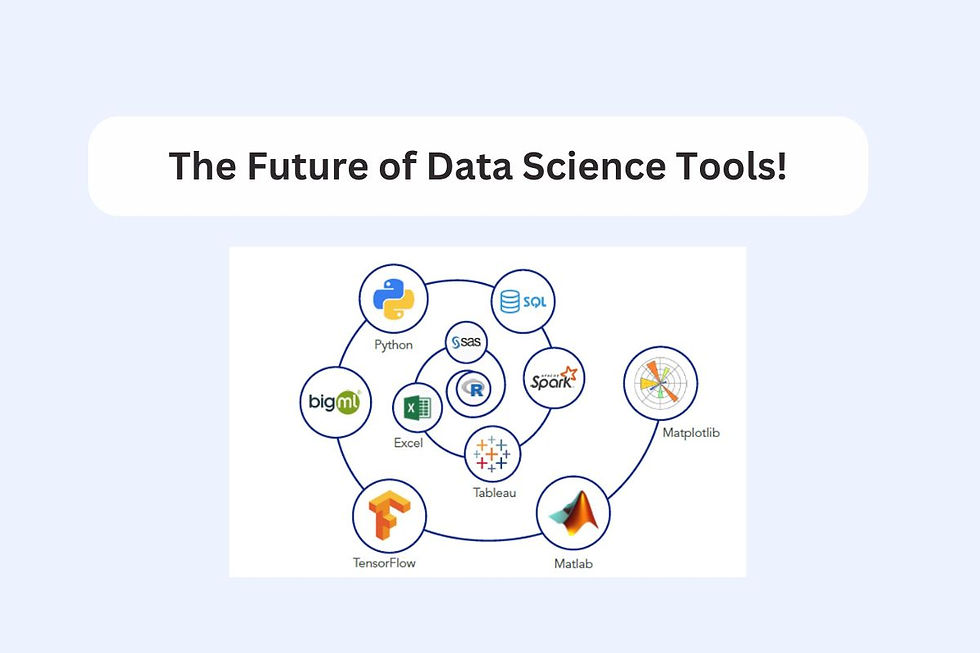Unlocking the Power of Data Science: Transforming Industries in the Digital Age
- archi jain

- Nov 4, 2024
- 4 min read

In our rapidly evolving digital world, data is everywhere. From the smartphones in our pockets to the sensors in our homes, vast amounts of information are generated every second. This wealth of data can be harnessed to unlock powerful insights, driving innovation and transformation across various industries. This article explores the fundamental concepts of data science and its transformative impact on our lives and businesses.
What is Data Science?
Data science is an interdisciplinary field that combines statistics, mathematics, programming, and domain expertise to extract meaningful insights from structured and unstructured data. It involves several key steps:
Data Collection: Gathering data from various sources, such as databases, online platforms, and sensors.
Data Cleaning: Processing and organizing data to remove inaccuracies and inconsistencies.
Data Analysis: Applying statistical methods and algorithms to identify patterns and trends.
Data Visualization: Creating visual representations of data to communicate findings effectively.
Machine Learning: Using algorithms to allow computers to learn from data and make predictions or decisions.
The Importance of Data Science
Data science is crucial for several reasons:
Informed Decision-Making: Businesses can make better decisions by analyzing data rather than relying solely on intuition or experience.
Efficiency and Optimization: Data analysis can identify inefficiencies in processes, helping organizations streamline operations and reduce costs.
Personalization: Companies can tailor their products and services to individual preferences by analyzing customer data.
Predictive Analytics: By identifying patterns in historical data, organizations can forecast future trends and behaviors.
Transforming Industries
1. Healthcare
Data science is revolutionizing healthcare by improving patient outcomes and streamlining operations. For instance:
Predictive Analytics: Hospitals use data to predict patient admissions and optimize staffing.
Personalized Medicine: By analyzing genetic data, doctors can tailor treatments to individual patients, enhancing effectiveness.
Disease Surveillance: Data science helps track and predict outbreaks, enabling faster responses to public health threats.
2. Finance
In the financial sector, data science is reshaping how institutions operate:
Risk Management: Financial companies use algorithms to assess credit risk and detect fraudulent transactions in real-time.
Algorithmic Trading: Data-driven trading strategies allow firms to execute trades at lightning speed, maximizing profits.
Customer Insights: By analyzing spending patterns, banks can offer personalized financial products and services.
3. Retail
Data science is transforming retail by enhancing customer experience and optimizing inventory management:
Recommendation Systems: Retailers use data to recommend products based on customer behavior, increasing sales.
Supply Chain Optimization: Data analysis helps predict demand, reducing excess inventory and minimizing costs.
Market Basket Analysis: Understanding the purchasing habits of customers allows stores to strategically place products and boost sales.
4. Transportation
Data science is making transportation safer and more efficient:
Traffic Management: Cities analyze traffic data to optimize signal timings and reduce congestion.
Ride-Sharing: Companies like Uber and Lyft use data to match drivers with passengers efficiently, minimizing wait times.
Predictive Maintenance: Airlines and transportation companies analyze data from vehicles to predict maintenance needs, reducing downtime.
5. Manufacturing
In manufacturing, data science plays a critical role in enhancing production processes:
Quality Control: Data analysis can detect anomalies in production, ensuring higher quality products.
Predictive Maintenance: By monitoring equipment, manufacturers can predict failures before they occur, reducing costs and downtime.
Supply Chain Management: Data helps streamline supply chains, ensuring materials are available when needed without overstocking.
The Role of Artificial Intelligence
Artificial Intelligence (AI) is a subset of data science that further enhances its capabilities. Machine learning, a branch of AI, enables computers to learn from data and improve over time without explicit programming. This leads to advanced applications such as:
Natural Language Processing (NLP): Allows computers to understand and respond to human language, enhancing customer service through chatbots.
Computer Vision: Enables machines to interpret and process visual information, used in areas like quality inspection in manufacturing.
Robotics: Data-driven robots are capable of performing complex tasks, from assembly lines to autonomous vehicles.
Challenges in Data Science
While data science offers immense potential, it also faces challenges:
Data Privacy: With increasing concerns over personal data usage, organizations must prioritize ethical data handling and compliance with regulations.
Data Quality: Poor quality data can lead to inaccurate analyses, underscoring the need for rigorous data cleaning processes.
Talent Shortage: There is a high demand for skilled data scientists, leading to competition among organizations to attract top talent.
Data Science Training in India
As the demand for data science professionals grows, so does the need for comprehensive training programs. Data science training in Noida, Delhi, Gurgaon, and other locations in India is becoming increasingly popular. These programs are designed to equip individuals with the necessary skills to succeed in this dynamic field. They typically cover essential topics such as data analysis, machine learning, statistical methods, and data visualization tools.
Many training institutes offer hands-on experience, allowing students to work on real-world projects and case studies. This practical approach ensures that graduates are not only knowledgeable but also job-ready. By investing in data science training, individuals can unlock career opportunities in various industries, contributing to the ongoing transformation driven by data.
Conclusion
Data science is unlocking unprecedented opportunities across industries, driving innovation, efficiency, and improved customer experiences. As organizations continue to embrace this powerful tool, they must navigate the challenges that come with it, ensuring ethical practices and high-quality data management. In the digital age, understanding and harnessing the power of data science is not just beneficial; it is essential for staying competitive and meeting the demands of an ever-changing landscape. By leveraging data effectively, businesses can transform their operations, make informed decisions, and ultimately thrive in the future.








Comments